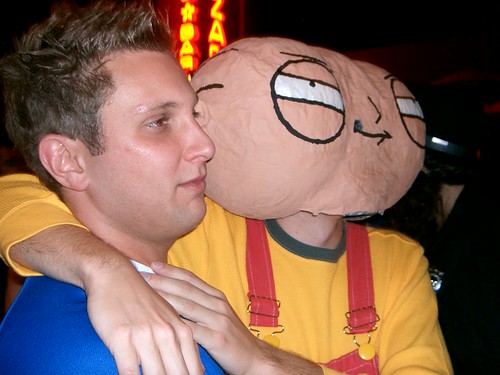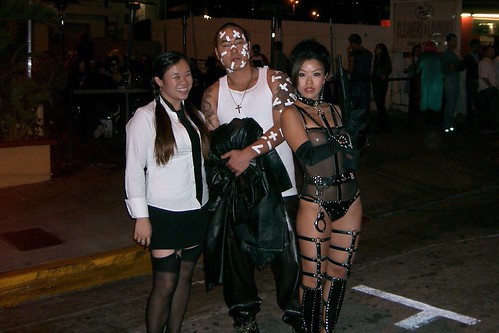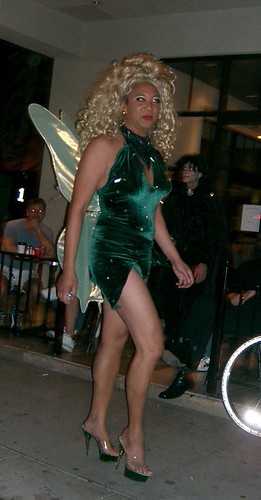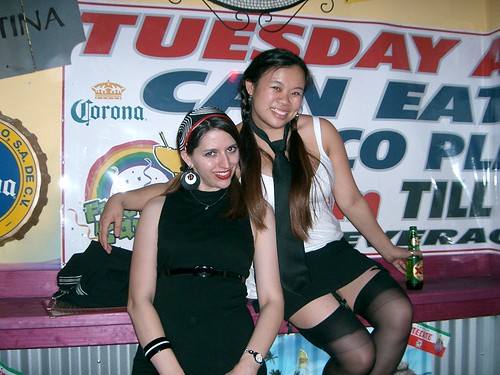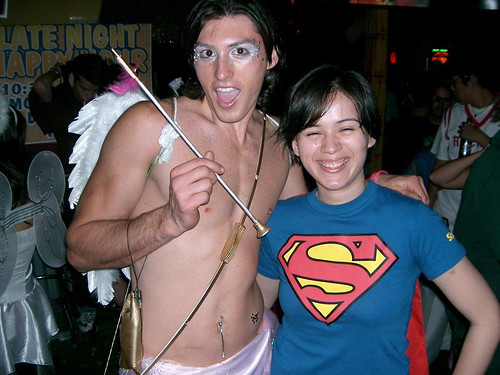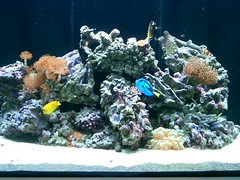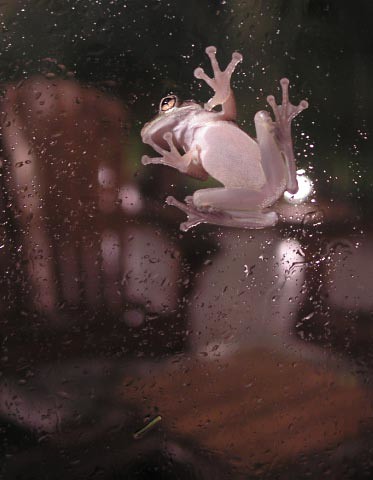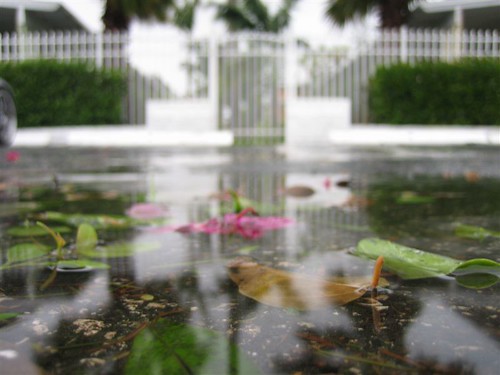doing theatre in a very restrictive department at williams meant that i heard the gist of the below sentiment quite often. unfortunately, it was often accompanied by a bit of anger, which always finds a way to mar good argument.
jess's testimony below, i think, strikes a great balance between the expression of her thought and her reaction to that thought...i don't agree with her on all points, but a great majority of them are dead-on, and i think she's hit the exact right pitch with her tone. it's a very good post.
visit her site here, and a link to her direct post here.
I am rebelling.
I am, first and foremost, rebelling against the idea that theatre cannot succeed simply by being enjoyable. When I say enjoyable, I don't mean catered to the lowest common denominator, but I do mean accessible, I mean funny, I mean uplifting, I mean (dare I say it) entertaining.
I think, if theatre can make you smile, can make you laugh, can make you realize for a moment a good feeling or a better feeling than the one you walked in with, that can be considered a success.
I think, too, that if theatre can bring you to some other moment of emotion--if it can stir you to anger, if it can bring you to tears, if it can give you some peace or clarity, that is successful theatre.
And, quite frankly, if that end is achieved despite a straightforward structure, simple dialogue, unoriginal ideas, predictable music, basic sets, shoddy costumes, ineffective blocking, odd direction, or mere lack of pretension--I don't care.
I'm taking a stand. I got into theatre because nothing gave me more pleasure in elementary school than to stand on the stage of my coffee table and sing--gasp--The Sound of Music. And quite honestly, I don't know if I've gotten that much pure joy from theatre since then. I've had fun, I've learned a lot, and I think that that's great. But I find the notion of theatre as Art And Only Art to be...bizarre. Experimenting with forms and ideas and theories is immensely interesting on an intellectual level and often results in some really amazing, thought-provoking, emotion-eliciting, beautiful work. But to judge everything else in the realm of theatre against whatever idea of "Good" is in vogue at the moment is to discard so much of value.
I'll let you in on a little secret, one that could get me kicked out of all Theatredom. I still adore Sound of Music. I still cherish Annie. I think that Evita--the Madonna version, 'cause Patti LuPone scares the crap out of me--is fantastic. I think Les Mis is great and I sing On My Own all the time. And I will say this and I will say it loud and clear. THERE IS NOTHING WRONG WITH ANY OF THAT.
For years, I've been taught by jeers, jests, comments, and criticisms of the other theatre folk to whom I have been exposed that things like Andrew Lloyd Weber and Rodgers and Hammerstein musicals are, essentially, worthless. That's snobbish, that's pretentious, and that's untrue. They are simple, they are straightforward, some of them due to time period, etc, are sexist/racist. That last is unfortunate, but generally society does not dismiss Lear because Goneril and Regan are crappy women, or Othello because people look down on his race. Producing plays from other times is not typically seen as an endorsement of the values of those times. But really, when it comes down to it, it's the simplicity, the predictability, and the familiarity of shows like that that are most criticized. Beckett it ain't, but Sound of Music is, legitimately, good theatre when performed with joy.
I never want to be someone who scoffs when they mention musical theatre, or sneers at the name "Neil Simon." If you don't care for something, that's a matter of personal opinion, and not something that should be dictated by anyone else's ideas of what constitutes Art or Theatre or Good or whatever. I appreciate very much being in an academic environment where I'm exposed to so many ideas and theories about what can be good, and where people try things and do obscure theatre and not just what is familiar and safe. At the same time, I think a lot of people here (faculty and students alike) tend to categorically reject pieces that are more popular simply because of their popularity. It's that attitude, and not individual preference, that bothers me.
I'm fairly certain that anyone working or studying in the field got into it because at some point they just did it because it was fun. That's what this comes down to for me--I'm not against hard work, challenging, frustrating creative processes, strange, obscure plays or choices, or straying from the beaten path. I am against the view so very neatly encapsulated for us (however facetiously) by none other than William Finn, that "If you're having a good time, you're not doing theatre." He was half-joking, and had been put on the spot when he walked into our workshop the other day, but some part of him meant it. My burning question: Why the hell not?
"All the world's a stage, and all the men and women merely players." PLAYERS. Theatre is something, at its most basic, that must be done out of joy, out of love, out of passion. I'm absolutely not putting forward the notion that every show must be one big tap number or a screaming laugh riot, but even when working on the sharpest, darkest tragedy, in order for it to be worth anything, it has to be somehow about the joy of creating and the intense, overwhelming need to communicate on a level other than the analytical, intellectual one that so many of us tend toward. It's possible for every level--design, tech, directing, performing--to be technically perfect, and for a play to fail because it does not inspire something in its audience. I've seen children of ten imbue performances with an intensity and passion that make a half-hour day camp musical genuinely riveting and hilarious, and I've seen adult actors on gorgeous sets in famous venues give performances that move me to look at my watch almost more often than I look at the stage.
This is theatre. If it's not, on some level, "a good time", then WHY would any of us be here? Theatre can have important messages, absolutely, but most kids don't get into theatre for political reasons. We got here because it was fun, it was intense, it was a real challenge artistically and intellectually but also emotionally...it's not brain surgery. It's not feeding the homeless. It's not saving the rainforest and it's not keeping the peace. It can occasionally try to work towards things like that...I think that's great, actually. But if that was all it was, people would just become brain surgeons or work for non-profits or whatever. It's something bigger. Theatre has the power to affect people personally by connecting with something deep and internal. If it lacks that, it's sunk. If it lacks that, it's a bunch of grown-ups playing dress-up and spending lots of money to create gigantic visual art installments that, in and of themselves, lack their final layer.
So, going forward, that's how I'll judge theatre. If it genuinely affects me, then it's successful for me. If it's theatre I'm making, I damn well better find a way to connect with it and with the audience, or I'm really not interested. Theatre for its own or, worse, for pretension's sake, is really not worth anything to me, and I no longer intend to let anyone tell me what's good theatre or to participate in any way that I can't find any passion for. I know that's not the way to make a living at it, and that's ok with me. I've realized that, as much as I love performing, I want my life's work to be bigger than that and to match more closely with all of this that's been percolating in my brain for the last few weeks. I want to keep doing theatre with kids--as a camp counselor, as a classroom teacher, or in an outside theatre group that I someday aspire to start. In my ideal world, this would be a program in a city that would allow kids of all ages to play on the stage, free of charge, simply for love of it. I really think that theatre with kids is one of the most amazing things I've ever witnessed. For the last six summers I worked at a plain, ordinary YMCA day camp, helping to run the drama program. We got 25 kids every Monday, and by Friday, without fail, those kids would put on a show (almost always a musical) that was leagues beyond what could possibly have been expected of them. Their desire to express the fun they were having and share it with the other campers, the staff, their parents--while perhaps not consciously expressed in their minds--absolutely shone through every second of their shows. And THAT is why I got into this business, and for me, THAT is where the whole value of it still lies.

